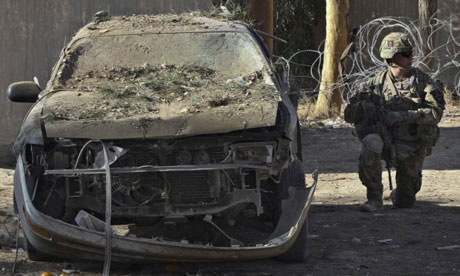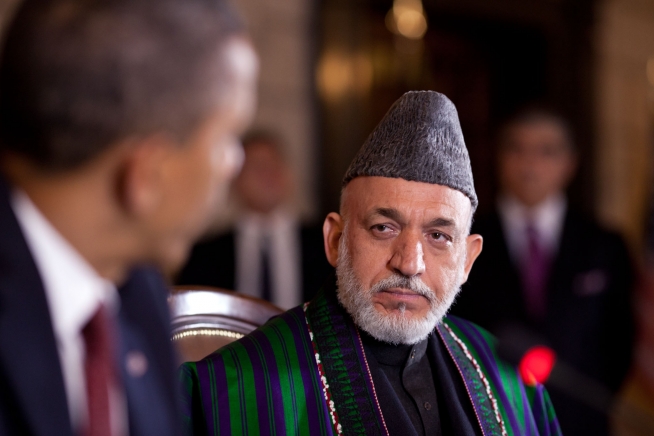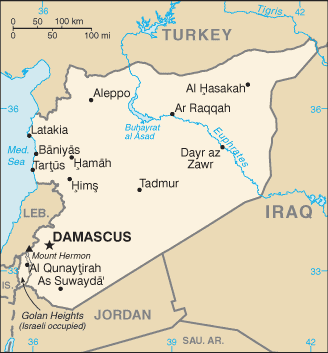http://www.guardian.co.uk/world/2013/jan/10/afghan-mps-warn-against-pullout
( The US cannot be Karzai's wet nurse forever....)

http://www.juancole.com/2013/01/afghanistan-americas-longest.html
http://antiwar.com/blog/2013/01/08/is-obama-entertaining-a-complete-withdrawal-from-afghanistan/

 For the past several months, the al-Nusra Front, initially a small but aggressive faction interested primarily in attacking Syrian media outlets, has grown into one of the biggest and most fearsome front-line fighting forces, with an estimated 5,000 fighters today.
For the past several months, the al-Nusra Front, initially a small but aggressive faction interested primarily in attacking Syrian media outlets, has grown into one of the biggest and most fearsome front-line fighting forces, with an estimated 5,000 fighters today.
 Of course Israeli analysts tend to see everything as centering on them, but the case is made that Netanyahu is eager as ever to launch a war with Iran, and that Hagel’s past comments on war being a “last resort” might keep him away from a hasty attack after the January election.
Of course Israeli analysts tend to see everything as centering on them, but the case is made that Netanyahu is eager as ever to launch a war with Iran, and that Hagel’s past comments on war being a “last resort” might keep him away from a hasty attack after the January election.
( The US cannot be Karzai's wet nurse forever....)
Afghan MPs warn against total pullout of US troops
Disaster and civil war will follow if all US forces leave after 2014, leaders warn, as Obama and Karzai prepare to hold talks

Chaos would follow US troops leaving Afghanistan without local forces being fully prepared, Afghan leaders have said. Photograph: Allauddin Khan/AP
Afghan politicians have reacted with alarm to a White House announcement that it is considering a complete withdrawal of US troops after 2014, warning that disaster and civil war would follow.
The Obama administration has said it is considering the so-called "zero option" of a complete pullout despite earlier recommendations from the top military commander in Afghanistan to keep soldiers there to help the government.
That option and the angry reaction from Afghan officials are likely to dominate talks between President Barack Obama and his Afghan counterpart, Hamid Karzai, in Washington on Friday.
The meeting was already likely to be tense given ongoing strains in their relationship over the war.
"If Americans pull out all of their troops without a plan the civil war of the 1990s would repeat itself," said Naeem Lalai, a lawmaker from volatile Kandahar province, the birthplace of the Taliban.
"It [full withdrawal] will pave the way for the Taliban to take over militarily," Lalai told the Reuters news agency.
When the Soviets left Afghanistan in 1989 after a decade-long war, financial aid dried up and the Afghan communist government collapsed, leading to infighting between warlords. A civil war paved the way for the Taliban's rise to power.
The United States has about 68,000 troops in Afghanistan and that number is expected to reduce sharply ahead of 31 December 2014, the official end of the Nato-led combat mission in the country.
Nato and its partners are trying to train Afghanistan's 350,000 security personnel but questions remain over how their effectiveness against insurgents and leading Afghan officials had assumed some US troops would stay.
"If American forces leave Afghanistan without properly training the Afghan security forces and equipping them it would be a disaster," said member of parliament Mirwais Yasini.
Shukria Barekzai, another MP, said a total withdrawal after 2014 would be equivalent to the United States "accepting defeat".
The Taliban said the US "zero option" was speculative and it had no comment for the moment.
The US deputy national security adviser Ben Rhodes said on Tuesday that the complete withdrawal was "an option that we would consider".
He made clear that a decision on post-2014 troop levels was not expected for months and would be made based on two US security objectives in Afghanistan: denying a safe haven to al-Qaida and ensuring Afghan forces were trained and equipped so that they, not foreign forces, could secure the nation.
Washington officials have privately said the White House is seeking a post-2014 presence of between 3,000 and 9,000 troops, which is significantly less than the 6,000 to 15,000 number given by the top commander, US General John Allen.
http://www.juancole.com/2013/01/afghanistan-americas-longest.html
Afghanistan: The End of America’s Longest War?
Posted on 01/09/2013 by Juan
Afghan President Hamid Karzai is in Washington for talks with the Obama administration on the gradual draw down of foreign troops from his country over the next two years. There are currently about 104,000 NATO and other outside troops in Afghanistan, including 68,000 Americans.
In a recent piece for CNN, I wrote:
“By summer of 2013, it is anticipated that the U.S. combat role in Afghanistan will draw to a close. By the end of 2014, only a few thousand U.S. troops will be left, and they will mainly supply close air support to the Afghanistan army when it engages in combat. Whether the some 350,000-strong Afghanistan security forces are up to the challenge of fighting the Taliban and other insurgents is a matter of great controversy. American officers in Kabul insist that the Afghanistan National Army (ANA) now takes the lead in 80 percent of operations against the enemy, up from 50 percent just last summer. But a recent Pentagon review admitted that only one of 23 ANA brigades is capable of functioning on its own, without U.S. or ISAF help. In 2012, some 300 were dying every month in battles with the Taliban and other militant groups. The ANA has low rates of literacy (a third the rate of the general population), high rates of drug use, and high rates of desertion. It is also disproportionately drawn from the Tajik, Dari Persian-speaking minority. Only 2 percent of the troops hail from Kandahar and Helmand Provinces in the Pashtun south, the strongholds of the Taliban.”
Earlier arguments about whether the US would keep 10,000 troops in Afghanistan after December 31, 2014, or only 3,000 have abruptly been eclipsed by a White House staffer’s announcement that the “zero option” is on the table. That is, the US may leave entirely.This threat is likely intended to convince Karzai to withdraw his objections to granting extraterritoriality (immunity from prosecution in Afghan courts) to the remaining US troops. It was the refusal of the Iraqi government to grant such immunity that led to the complete withdrawal of US troops from that country at the end of 2011.In Iraq, PM Nouri al-Maliki would have had to get extraterritoriality passed through his parliament (which nowadays is up in revolt against him), and that would have been impossible. The Iraqi parliament is full of Shiite nationalists and Sunni nationalists who were dying to see foreign soldiers out of their country.The Afghan parliament is even weaker than the Iraqi, and Karzai can probably make his own deal with Washington. But he can’t act just as he pleases.Karzai’s opposition among hard line Muslim fundamentalists are painting him as a traitor for signing any agreement at all with the US on the post-combat American troop presence. Karzai wants to negotiate a settlement with them, which is probably not impossible, but they say American troops remaining in their country is a deal breaker with regard to negotiations.Nor can the president afford to alienate too many MPs in his own, weak parliament, since some of them are still movers and shakers in the country.Will Karzai fold on the immunity issue and grant extraterritoriality to US troops? Or will he risk the departure of the Americans (whom he has sometimes admitted he does not like very much).I don’t doubt that in the absence of a deal on immunity from prosecution in local courts of US troops, the Obama administration would be perfectly willing to pull them all out. Obama is a Pacific Rim president and is annoyed by the distractions of the Middle East, which he does not think is very important compared to China, Japan, the Koreas and the Philippines.
I wrote at CNN:” Ironically, the draw-down of Western forces may make it easier for warring Afghan factions to begin serious negotiations with one another over the shape of the future. The United States has reportedly given up on attempting to play a role in those talks, and is bequeathing the task of achieving a negotiated settlement to the Afghans themselves and to Pakistan. The Taliban and other insurgent groups have repeatedly said that the end of the foreign troop presence is a precondition for any serious talks. Perhaps light at the end of that tunnel will be enough to at least begin behind-the-scenes discussions. It is also possible, however, that the radicals will attempt to improve their eventual bargaining position by taking more territory from Karzai and his successor.
http://antiwar.com/blog/2013/01/08/is-obama-entertaining-a-complete-withdrawal-from-afghanistan/
Is Obama Entertaining a Complete Withdrawal From Afghanistan?
John Glaser, January 08, 2013

Retired Lt. Gen. David W. Barno, now at the Center for a New American Security,writes at Foreign Policy on Hamid Karzai’s upcoming visit to Washington to discuss with the Obama administration a status of forces agreement for Afghanistan beyond 2014. He argues it’s possible a complete withdrawal is a viable option.
The top US military general in Afghanistan, John Allen, has recommended keeping 6,000-20,000 US troops in country after the vaunted and wildly misrepresented 2014 “withdrawal.” Anonymous administration officials told Reuters Obama is quietly considering slightly less troops to stay beyond 2014, with numbers like 3,000-9,000 floating about.
But Barno says the “zero option,” which ultimately was chosen for Iraq despite administration efforts to keep thousands of troops there in a new status of forces agreement, is sitting in the back of Obama’s mind as one possible option.
Karzai comes to this week’s discussions convinced that the United States desperately needs long-term military bases in Afghanistan. He sees an America without other viable options to maintain its regional influence, cajole Pakistan, threaten Iran, or launch raids against nearby terrorists. Because of this, Karzai thinks that he holds all the cards in the upcoming negotiations. He is absolutely convinced that the United States has no workable strategic choice but to station substantial U.S. troops in Afghanistan after 2014.
“But Karzai has it wrong,” Barno says, for at least five reasons: (1) pullout worked ok for Iraq; (2) budgetary pressure; (3) the war weariness of the American publish; (4) US capacity to handle Afghanistan remotely; and (5) a covert intelligence war may be better than keeping troops if we get backed into a corner on a SOFA.
I see Barno’s point, and I think his five reasons are fair, but I don’t buy it. He counters his own argument more than he supports it. He admits that, absent US troops Afghanistan would descend into civil war with a probable return of the Taliban, Washington’s ability to contain Pakistan and launch drone strikes in the tribal regions would be significantly undermined, etc. I don’t expect the Obama administration to risk these scenarios.
But there are more reasons the “zero option” isn’t going to happen this time around. Afghanistan is not Iraq. With Iraq, you had a more stable and independent government that was defiant of US encroachment. That was the driving force behind Maliki’s inability/refusal to produce an acceptable SOFA to the US. In Afghanistan, Karzai’s government is extremely weak and barely operational on its own – that is, without the support of thousands of US troops and billions in foreign aid. Yes, Karzai has demonstrated his own limited defiance of Washington, but I doubt it will hold this time. He needs Washington to survive.
Secondly, Iraq was Bush’s war. Obama followed through on the SOFA signed under Bush. The immediate political costs of a full withdrawal seemed to rest much less on Obama’s shoulders in that case. Afghanistan is different. That is Obama’s war; he decided to surge in 2009, he owns it. And he’ll therefore be more concerned with Afghanistan for the long term and less inclined to pull out.
At least, that is how I speculate the administration sees it. It’s still the case that so long as any foreign occupation exists in Afghanistan, and so long as any Kabul government is propped up from abroad, the insurgency will remain alive and well. There are a host of bad options in Afghanistan and the reality is that a complete withdrawal now is the least bad, whether Obama sees it that way or not.
Update: Al-Jazeera reports that “A senior White House official has said the US would consider leaving no American troops in Afghanistan after the end of combat in December 2014.”
Asked whether Obama would consider a scenario in which all US troops left and there was no residual force in Afghanistan, Ben Rhodes, a deputy national security adviser said: “That would be an option we would consider.”“We wouldn’t rule out any option. We are not guided by the goal of a certain number of troops in the country. We are guided by the objective that the president has set,” Rhodes told reporters.
I still find this incredibly unlikely. The Washington phrase “not ruling out any options” is a complicated one, to say the least.
And from Syria......
http://news.antiwar.com/2013/01/08/al-nusra-front-emerging-as-major-force-in-syrian-rebellion/
Al-Nusra Front Emerging as Major Force in Syrian Rebellion
Al-Qaeda-Endorsed Faction Now 5,000 Fighters Strong
by Jason Ditz, January 08, 2013
The first full year of the Syrian civil war has come and gone, and if 2012 began as the year of the Free Syrian Army, with its collection of military defectors, 2013 looks to be the year of the al-Nusra Front, a terrorist-styled organization with a formal endorsement from al-Qaeda.
 For the past several months, the al-Nusra Front, initially a small but aggressive faction interested primarily in attacking Syrian media outlets, has grown into one of the biggest and most fearsome front-line fighting forces, with an estimated 5,000 fighters today.
For the past several months, the al-Nusra Front, initially a small but aggressive faction interested primarily in attacking Syrian media outlets, has grown into one of the biggest and most fearsome front-line fighting forces, with an estimated 5,000 fighters today.
This has complicated US interests in propping up the rebels with an eye toward eventually installing them as the new government, as they have already labeled al-Nusra a foreign terrorist organization, and claim that the group’s leadership is virtually indistinguishable from al-Qaeda in Iraq (AQI).
Which appears accurate, but with the group taking an ever stronger lead in the civil war, the US will quickly find itself simultaneously labeling the group an “al-Qaeda affiliate” while arguing that the rebels they are such a huge part of deserve to be the new regime in Syria.
And Iran items.....
http://news.antiwar.com/2013/01/08/is-hagel-a-message-to-netanyahu-not-to-attack-iran/
Is Hagel a ‘Message’ to Netanyahu Not to Attack Iran?
Iranian Officials Express Hope Hagel Nomination Will Mean Negotiations
by Jason Ditz, January 08, 2013
Is the nomination of Chuck Hagel as defense secretary a message to anyone in particular? That has been a matter of debate for weeks, and despite myriad different answers from different analysts, Israelis see the message aimed squarely at Prime Minister Netanyahu.
 Of course Israeli analysts tend to see everything as centering on them, but the case is made that Netanyahu is eager as ever to launch a war with Iran, and that Hagel’s past comments on war being a “last resort” might keep him away from a hasty attack after the January election.
Of course Israeli analysts tend to see everything as centering on them, but the case is made that Netanyahu is eager as ever to launch a war with Iran, and that Hagel’s past comments on war being a “last resort” might keep him away from a hasty attack after the January election.
Publicly Israeli officials have denied any opposition, but some have conceded being “concerned” by the nomination, even as Hagel struggles to deal with allegations of anti-semitism based on his presumptive reluctance to start a huge new war on Netanyahu’s say-so.
It’s just one of many theories on the nomination, but it appears to also have some currency in Iran, where foreign ministry officials are welcoming the Hagel nomination and expressing hope that it means “practical changes” to US aggression toward Iran.
Syria’s 50 tonnes of unenriched uranium missing
DEBKAfile January 9, 2013, 8:58 AM (GMT+02:00)
DEBKAfile January 9, 2013, 8:58 AM (GMT+02:00)
Bashar Assad was close to building a nuclear reactor at Al-Kibar in eastern Syria with assistance from North Korean when it was destroyed by Israel in 2007. The stock of 50 tonnes of unenriched uranium, enough for weapons grade fuel for five atomic devices, has since gone missing and may have passed to Iran, the Financial Times reports Wednesday. Fears have been triggered by signs of movement at a secret uranium conversion facility that the Syrian regime built at the town of Marj al-Sultan near Damascus. DEBKAfile: The Syrian reactor was designed on on the North Korean model at Yongbyon. Had it not been destroyed, an allied nuclear weapons production chain would have been in operation from Pyongyang through Tehran to Damascus.
No comments:
Post a Comment